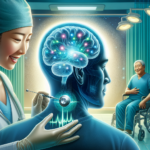In a breakthrough moment for individuals battling ALS (Amyotrophic Lateral Sclerosis), artificial intelligence has emerged as a promising ally. AI-driven technology has successfully restored a personal voice to a patient who had lost his ability to speak due to the ravaging effects of this debilitating disease. This remarkable advancement in voice restoration not only showcases the capabilities of modern technology but also highlights the profound impact it can have on communication, personal expression, and overall quality of life for millions affected by similar conditions.
The Journey of Distressing Silence
ALS, a neurodegenerative disorder, affects nerve cells in the brain and the spinal cord, leading to a gradual loss of muscle control and, ultimately, the ability to communicate verbally. For many, losing one’s voice is not only a physical struggle but also an emotional one, stripping away their identity and making it challenging to connect with loved ones.
One patient, who is central to this inspiring story, experienced the heartbreaking effects of ALS firsthand. After years of battling the disease, he faced a daunting silence that left his thoughts trapped within. The communication gap not only isolated him but also impacted his family and friends, limiting their interactions and the quality of their relationships.
Harnessing the Power of AI
In a pioneering effort to restore his voice, researchers turned to advanced AI technology capable of synthesizing speech. This innovative approach involved several critical steps:
- Voice Cloning: The process began with voice cloning technology, which uses machine learning algorithms to study a person’s vocal characteristics. The patient provided a limited number of voice samples that were analyzed to capture the essence of his speech patterns, intonations, and emotions.
- Neural Networks: Utilizing sophisticated neural networks, the AI was able to learn from these samples and generate a digital voice that closely resembled the patient’s original voice.
- Text-to-Speech (TTS) Technology: The final step involved integrating this customized voice model into a text-to-speech system, allowing the patient to type out messages that would then be spoken in his own voice.
A Heartfelt Reunion with Communication
The moment the patient used the AI-powered system to express himself again was truly transformative. Hearing his own voice, after years of silence, was not just a technological triumph; it was an emotional milestone for him and his family.
This innovative solution has opened new avenues for communication, with the potential to reshape how individuals with ALS engage with the world around them. Family members reported feeling an overwhelming sense of joy and relief as they witnessed a return to normalcy in their conversations, where emotions, humor, and shared memories could be expressed freely once more.
Broader Implications for ALS and Beyond
The implications of this breakthrough extend far beyond one patient. According to the ALS Association, thousands of people are diagnosed with ALS every year, and many face similar communication barriers. The emergence of AI for voice restoration serves as a beacon of hope for those grappling with speech-related challenges, not just from ALS, but from other conditions such as:
- Parkinson’s Disease: A condition that can also affect speech clarity due to tremors and muscle rigidity.
- Stroke: Many stroke survivors experience aphasia, losing the ability to communicate effectively.
- Vocal Cord Paralysis: Individuals may lose their voice due to nerve damage, yet can benefit from voice restoration technology.
Advancements in AI Technology
The journey of AI in voice restoration continues to evolve with significant advancements. Researchers and technologists are working relentlessly to improve the accuracy and emotional resonance of synthesized voices. Some future prospects in this exciting field include:
- Real-time Communication: Enhancing the technology to allow for live conversations, providing a seamless interaction experience.
- Multi-language Support: Developing multilingual voice models to cater to a diverse clientele, ensuring inclusivity for non-English speakers.
- Augmented Reality Integration: Exploring the possibility of integrating AI voice restoration with augmented reality platforms, creating interactive and engaging environments for communication.
The Human Connection
While technology plays a vital role in this transformation, it is the human connection that remains paramount. The relationship between the patient and their caregivers, family, and friends plays a critical part in the healing and adaptation process. The ability to communicate in one’s own voice fosters deeper connections, promotes emotional well-being, and enhances the quality of life.
Moreover, this journey empowers individuals with ALS and similar conditions to reclaim their narrative. They can express their thoughts, feelings, and desires, ultimately allowing them to participate more fully in their communities. This technology’s impact goes beyond mere words; it revitalizes the human spirit, allowing them to engage in moments that truly matter.
Encouraging Support and Awareness
As this groundbreaking technology gains traction, a collective effort is required to promote awareness and support for those battling ALS and other speech-impairing conditions. Here are some ways you can make a difference:
- Advocate for Research Funding: Support initiatives and organizations dedicated to ALS research and technological advancements.
- Educate Others: Share information about ALS and the challenges faced by those living with the disease to foster empathy and understanding.
- Participate in Events: Join community events aimed at raising funds and awareness for ALS research and patient support programs.
The restoration of voice, made possible through AI, is a remarkable testament to the power of technology in bridging the gap between silence and expression. As we continue to embrace these innovative solutions, the future looks promising for individuals facing the challenges of ALS and other voice-affecting conditions. The journey toward enhanced communication is not just a personal triumph for patients; it signifies a collective victory for humanity as a whole.




0 Comments